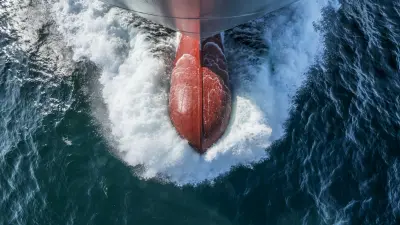Full speed ahead
Shipping is responsible for 90 percent of global trade - and must become more climate-friendly. As a major supplier of injection systems for large engines, Bosch has long had a clear vision of the future.

The future of shipping lies not only on the world's oceans, but also in the Austrian Alps
"We have big mountains in front of us and big challenges ahead of us," says Rene Schimon, looking off into the distance and laughing. Schimon is product manager for large engines at the Hallein site in Austria. Just outside Salzburg, Bosch develops, manufactures, and sells fuel injection systems and components for the very large engines that are used in ships, for example. Until now, these have been powered almost exclusively by fossil diesel and, in some cases, heavy fuel oil - but that is unlikely to be the case for much longer. The climate crisis is also a major issue in the shipping industry.
"It took the industry a little longer than other mobility sectors, but the course is now clearly defined: Shipping companies want to become more climate and environmentally friendly," says Schimon. Partly because they are facing increasingly stringent rules on carbon dioxide emissions and pollutants. Currently, shipping is responsible for emitting about one billion metric tons of carbon dioxide annually, or about three percent of total man-made emissions. Annual fuel consumption in the shipping industry is already around 350 million metric tons - with the projected demand for ocean freight alone expected to nearly triple by 2050 compared to 2015 levels.

Injection technologies for existing marine fuels such as diesel have long been established

All the greater is the challenge now facing the industry
Injection technologies for existing marine fuels such as diesel have long been established - all the greater is the challenge now facing the industry. Initial steps, such as adapting existing technologies to biofuels, have been taken. In the medium term, however, significantly lower-emission solutions are needed - and with them entirely new engine, combustion and injection technologies. "We are on the verge of a new technical beginning," says Jens Stein, head of development for large engines. It had long been clear to everyone in the industry that things could not go on as before. "The problem: For years, no one really knew in which alternative fuels the future lay."
This is also due to the special nature of shipping: Everything rises and falls with economic efficiency. Around 90,000 ships of various sizes sail the world's oceans - apart from ferries and cruise liners, it is mainly freighters such as container ships that are responsible for 90 percent of global trade. Under time pressure and often carrying hundreds of thousands of tons of heavy cargo, they sail from continent to continent to keep the global economy running. "Margins are often slim. So fuel costs, fuel availability and engine efficiency are hugely important when it comes to evaluating new fuels," says Stein.
Methanol as a beacon of hope
In their search for a solution for the future, Bosch experts held more than 200 talks with shipping companies, engine and fuel manufacturers, research institutes and other institutions. Fuel cells and purely battery-powered electric motors were ruled out as alternatives because they were simply not powerful enough. In the meantime, the company has settled on three low-emission fuels in which it sees the greatest opportunities by 2050: Methanol, hydrogen and ammonia.
Whereby methanol clearly stands out. Its biggest advantage is its energy density. Although it is only half as high as that of diesel, it is much higher than that of liquid hydrogen and even higher than that of ammonia. "You need much less space for a methanol tank than you would for hydrogen and ammonia. That's critical because space equals money on ships," Stein says. Hydrogen could be an alternative for shorter ship trips, such as ferries. Ammonia, he says, is very cheap, but it is also toxic and has not yet been researched enough for combustion technologies. Another advantage of methanol is that alcohol fuels have been used in industrial applications around the world for decades. Supply chains and an infrastructure already exist, but they still need to be significantly expanded.

High development effort
"For a good climate balance, it is important that the methanol is produced with the help of renewable energies. If this can be achieved, methanol can significantly reduce greenhouse gas emissions at sea or even ensure completely climate-neutral operation," says product manager Schimon.
Bosch has recently started building prototypes of methanol injection systems for ships in Hallein, the largest plant in Austria. The first customer projects with new propulsion technologies have already been won, but the road is long. "The differences to the diesel engine are considerable. We are making extensive development efforts," says Schimon.
Stein emphasizes, "Our first prototypes are already quite good." It will take many years to reach the efficiency level of today's diesel system, he says. But the upheaval is also an opportunity, he says: "The newly emerging market offers us the chance to establish ourselves on the market in the long term."
